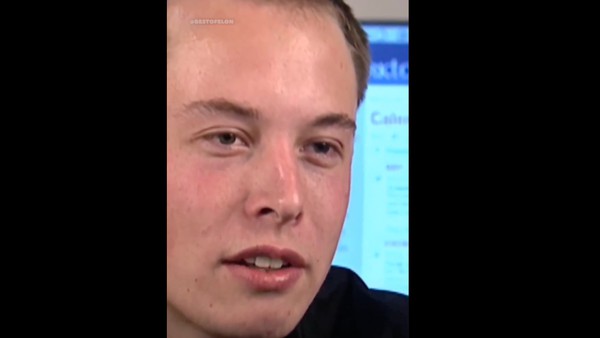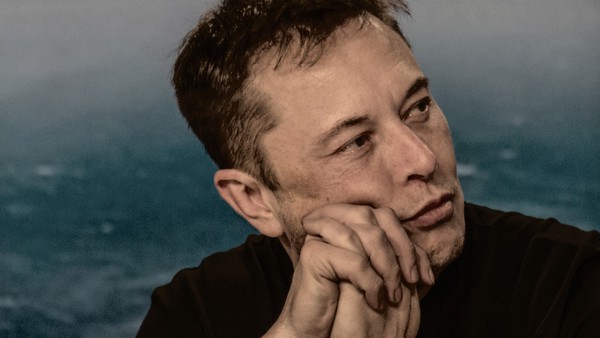This week’s edition of The Newsletter kicks off with two articles that ultimately spring from what might be called the Big Social Media Meltdown. Beginning with the problem, the first finds yours truly wrestling with the problem of Elon Musk, and his apparent efforts to destroy his own reputation and the platform he spent $44 billion to control. The second piece, by our CEO and director of product Chris Neklason, describes one specific way Twitter/X is now broken, and his recent successes in building something that delivers a functionality we used to find under the little blue bird.
| View in Browser | Our Journalism Needs Your Support | Please Donate Today |


By Eric Johnson
Published Sep 18, 2023
 What the hell happened to this sweet, smart kid?
What the hell happened to this sweet, smart kid?
Replacing Twitter as Elon Self-Destructs
Making Sense of a Mad Genius
I first encountered Elon Musk at a private conference while researching a cover story about the new billions being invested in eco-friendly technologies, “The Green Gold Rush,” published in Metro Silicon Valley 15 years ago this week.
Speaking to a roomful of venture capitalists from firms including Kleiner Perkins and JP Morgan, Musk talked about, among other things, his dream of enabling the colonization of Mars. At the time I had no idea his mind was moving in that direction, was sorta shocked, and expected the idea to land awkwardly. But he received an explosive ovation. He was a hero even before he revolutionized the industry that builds the world’s most poisonous product.
Already an extremely wealthy man, Musk seems to be motivated more by a historical imperative than any strictly business or even classically altruistic purpose. He says he started Tesla “to show the car companies what is possible, and accelerate the development of electric vehicles” overall.
Well, he did that, but the number of people who still think of him as a hero is dwindling. In the wake of Walter Isaacson’s new biography of the world’s wealthiest individual, following years of Musk’s brazenly erratic behavior, he is being attacked, most ardently by former allies in left-of-center field. As a onetime admirer, I wrestle here with a man who seems to be rocketing from brilliant enigma to dangerous nutcase.
The Self-Demonization of Elon Musk


|
El Dorado County's Homepage |
| Direct your browser to https://eldorado.californialocal.com/ to catch up on the latest news in California and El Dorado County. Bookmark the link and visit often, there's a lot happening in your community! | |
Getting the Ground Truth Out
Elon Musk did not waste time turning the platform he called “the digital town square” into his private property. One of the first and worst things he did was eliminate a functionality that public agencies used to distribute important information.
For years, organizations from the CHP to the California Office of Emergency Services used the platform as a primary means of informing the public. Many of us have shared and found information about wildfires and floods on Twitter, or even just traffic jams. Not so on X.
Here’s how California Local is working with Google Maps to make that important information available.
Distributing Ground Truth by Mapping the Situation

Get to Know a Group

|
Golden Empire Council |
The Golden Empire Council of the Boy Scouts of America pursues the mission of this national organization to “instill values in young people and prepare them to make ethical choices during their lifetimes, to take leadership roles as adults, and to reach their full potential.”

|
From Our Media Allies |
→ View All |
 |
Fuel Mapping, Drones Represent Next Wave of Firefighting |
|
The GigaFire Project will help land managers identify where fire risk is the greatest and determine which fuel reduction methods are most effective in a specific area. |
 |
Achieve Tahoe Expands Access to Outdoor Recreation |
|
Nonprofit organization Achieve Tahoe is a pillar of adaptive outdoor recreation in the Lake Tahoe area, providing inclusive physical and recreational activities that proactively build health, confidence, and independence. |
 |
Chamber Event Looks at Ups, Downs of Current School Year |
|
South Lake Tahoe residents heard from Lake Tahoe Unified School District Superintendent Dr. Todd Cutler at a State of Education address hosted by the Tahoe Chamber of Commerce. |
 |
Lake of the Sky Celebrates Lake Tahoe Basin Management Unit History |
|
USDA Forest Service Lake Tahoe Basin Management Unit is celebrating its 50th anniversary with a Sept. 22 presentation by radio personality and historian Don Lane. |
 |
Lake Tahoe Community College Launches Cross-Country Teams |
|
Matthew Airola, a two-time California Community College Athletic Association cross-country and track and field champion, was hired by the Lake Tahoe Community College to coach new track programs for men and women. |
 |
Parasol Tahoe Community Foundation Awards Nearly $300K in Grants to Local Nonprofits |
|
In 2023, for the first time, Parasol Tahoe Community Foundation invited its Donor Advised Fund holders to co-invest in Community Fund grants that allow nonprofits to request the support they need to better serve the Tahoe region. |

|
Recent Local News |
→ View All |
• Taxing Vacation Homes? Citizens in South Lake Tahoe Eye Ballot Measure
Locals for Affordable Housing aims to place a voter initiative on the November 2024 ballot modeled after Berkeley’s vacancy tax, which requires owners of homes that sit vacant more than six months to pay $3,000 for the first year and $6,000 every year after.
(09/17/2023) → CapPublicRadio• First Tribal Voter Registration Center in Nation Established
The Shingle Springs Band of Miwok Indians Tribal Council made history on Sept. 12 by designating a voter registration center on tribal land—the first of its kind.
(09/15/2023) → Mountain Democrat• Local Composer Rhapsodizes About Sierra Nevada
InConcert Sierra Orchestra premiered local composer Alexis Alrich’s “Sierra Rhapsody,” a work composed for pianist Lynn Schugren and written as a tribute to the Sierra foothills communities.
(09/15/2023) → Mountain Democrat• El Dorado County Board of Education Gains New Trustee
Dr. Charles Ware took the Oath of Office and officially assumed the position of trustee for Area 1.
(09/13/2023) → Mountain Democrat• NASA Technology Can Spot Wine Grape Disease From the Sky
Using intricate infrared images captured by airplane over California's Central Valley, researchers were able to distinguish Cabernet Sauvignon grape vines that were infected but not showing symptoms.
(09/12/2023) → Daily Democrat

|
Recent Statewide News |
→ View All |
• Cal Fire Issues Urgent Warning Regarding Incursions of Unmanned Aircraft Systems
Incidents involving use of the systems, commonly known as drones, in firefighting airspace have led to the temporary suspension of critical aerial firefighting operations a half-dozen times so far this year.
(09/15/2023) → YubaNet• New COVID Boosters Are Coming: What You Need to Know
Cases are on the rise, and so are hospitalizations and deaths. So the federal government's release of new, updated COVID boosters feels like good timing.
(09/13/2023) → CapPublicRadio• Cal State Tuition to Rise 34 Percent Over Five Years
The tuition increases were forecast earlier this year, when a Cal State task force concluded the system needs at least $1.5 billion annually in new revenue to afford student services and bolster its academic offerings.
(09/13/2023) → CalMatters• Climate Bill Forcing Companies to Reveal Carbon Emissions Passes, Newsom Yet to Say if He’ll Sign it
About 5,300 companies would file annual emissions reports. The aim is to hold corporations accountable for the role they play in climate change.
(09/12/2023) → CalMatters• Meet California’s (Possible) Future State Bat
There’s an official state bird, mineral, tree, fish, insect, lichen, fabric, sport, dance, soil and even dinosaur.
(09/12/2023) → CapPublicRadio• Opioid Antidote Now Available in Drug Stores
Naloxone, a nasal spray that can reverse the adverse effects of opioids, became available in drug stores last week. The drug is sold under the brand names Narcan and RiVive and can be purchased over the counter.
(09/12/2023) → Palo Alto Online• No Classes? No Lectures? Still Get Your Degree? Yes, Under an Experimental New System at California Community Colleges
Eight community colleges in California are testing out a new education model, one that defines success by the skills a student learns, not the time they spend in a classroom. But changing the traditional education system isn’t easy.
(09/11/2023) → CalMatters• New Bill Comes to Rescue When California Public Records Requests Are Denied
A bipartisan bill would create a state ombudsperson to intervene when public records requests are denied. But an advocacy group is concerned that it will encourage state agencies to go to court.
(09/11/2023) → CalMatters